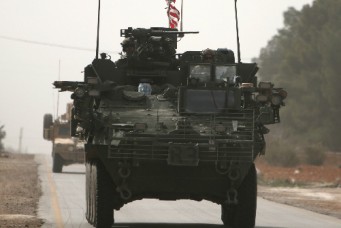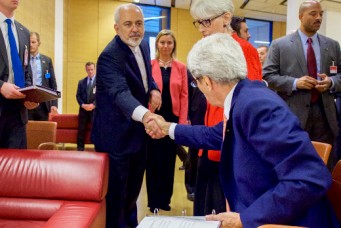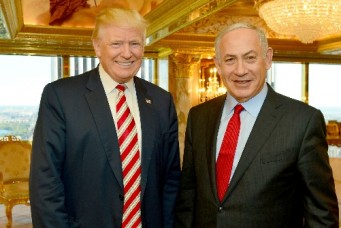Arab Gulf’s Mislaid Hopes in Trump
The contradictions of U.S. foreign policy could lead to renewed tensions with Gulf leaders.

President Donald Trump and Deputy Crown Prince Mohammed Bin Salman at the White House, March 14, 2017. Kevin Lamarque/Reuters
Saudi Arabia and the other five countries of the Gulf Cooperation Council (GCC) greeted the President Donald Trump administration with a sigh of relief. They had become unnerved by President Barack Obama’s perceived appeasement of Iran and its expanding influence. For the GCC, Iran represents an existential threat to not just their external sovereignty, but internal stability, given the presence of often-marginalized Shia communities within these Sunni nations. Reassuringly, the United States has thus far adopted aggressive policies aimed at the Iranian regime.
The Trump administration instantly responded to Iranian missile testing in February by imposing new sanctions. It permitted major Saudi Arabian and Bahraini arms deals previously blocked by President Obama due to human rights concerns, hinting that many more weaponry sales were to come. In addition, American promises to obliterate the Islamic State in Iraq and Syria (ISIS) and Al-Qaeda in the Arabian Peninsula have resonated in GCC capitals. The Trump administration has scaled up not just its logistical support for the Saudi Arabian-Emirati intervention in Yemen, but also its broader counterterrorist actions. Drone strikes and special forces activities have increased, while new U.S. troops have landed in Syria.
The GCC monarchies have responded enthusiastically to Washington’s return to anti-Iranian belligerency. Ties with the United States have warmed considerably: in early March, Saudi Arabia dispatched Deputy Crown Prince Mohammed Bin Salman Bin Abdelaziz to meet with President Trump, while weeks later Qatar’s defense minister visited the Pentagon. Earlier in February, one of Defense Secretary James Mattis’s first foreign trips entailed a special Gulf mission to the Emirates. Equally telling has been GCC silence on two controversial Middle East policies issued by the Trump administration—the immigration and refugee ban against a number of non-GCC Arab states, and the laptop ban slapped against major regional airlines, including Gulf carriers like Emirates and Qatar Airways.
Trump’s moves, however, are not convincing evidence that the United States will fully commit itself to achieving GCC interests in relation to Iran. Indeed, there are severe contradictions in U.S. foreign policy concerning the geopolitics of the Islamic State, populist pressures in America, and impact on energy markets that make it difficult to envision a smooth U.S.-GCC alliance in the manner envisaged by the Gulf states.
The Trump administration’s goal of destroying the Islamic State requires accepting Iran’s expanding regional influence. In Syria, the United States accommodates the permanence of Russian support for President Bashar Al-Assad, because fully restoring his rule would mean a weakened or destroyed ISIS. This holds despite Russian disagreement with the American missile strike against Syrian military forces, which responded to the regime’s chemical weaponry use: no matter what tensions cyclically emerge, the Trump administration will likely not sacrifice relations with Russia to oust an Arab regime that poses no threat to U.S. homeland security. Yet ensuring Al-Assad’s survival was also Iran’s goal from the start, except in this case a post-war Syrian regime would act as a stronger outpost of Iranian interests given its reliance upon Iranian-backed Shia groups like Hezbollah (which the Arab League declared a terrorist organization in 2016).
A similar paradox exists in Iraq. Eradicating ISIS there, which the GCC advocates through U.S. intercession, requires a strengthened Iraqi military and political state. However, this means tolerating not just ongoing Iranian support to Iraqi and Kurdish forces but also Tehran’s long-term ambition of keeping the Shia-led government in Baghdad intact. In sum, destroying ISIS means could mean restoring two Iranian client states—hardly an ideal scenario for the GCC, regardless of what happens with Iran’s proxy war in Yemen.
President Trump must also contend with strong populist pressures from American constituencies that mitigate against accommodating Gulf strategic interests too closely. Indeed, Trump’s most lauded military actions, from more drone strikes in Yemen to sending troops to Syria, merely extend preexisting authorizations from the Obama era; they do not represent any radical shift in U.S. policy. The U.S. missile strike in Syria did exceed Obama’s policy in terms of punishing a regime for using chemical weapons, but it also embodies the only type of operation tolerated by the American public—extremely limited, no U.S. casualties, and no commitment to future involvement. Such stark realism reflects cumulative fatigue with overseas interventionism in Afghanistan, Iraq, and Libya, none of which cleanly produced political stability and liberal democracy as promised.
Another pressure point concerns the JASTA (Justice Against Sponsors of Terrorism Act), a new U.S. law that allows victims of 9/11 to sue Saudi Arabia. Saudi Arabian lobbying for Trump to overturn the law runs counter to the president’s own nationalist image as one enraged by terrorism on American soil. Indeed, Trump’s own Attorney General, Jeff Sessions, helped pass the JASTA legislation as a U.S. senator in 2016.
Finally, the Trump administration’s belief in energy independence directly harms the GCC’s rentier economies. Crashing oil prices have devastated the revenue streams of the energy-exporting Gulf kingdoms, forcing them to draw on cash reserves and even consider austerity measures to scale back budget deficits. One major reason oil prices have not approached its 2014 high of over $100 per barrel is because the continuous U.S. commitment to escalate shale oil production.
The saturation of global energy markets with new North American supplies has robbed the Organization of Petroleum Exporting Countries (OPEC) of its already fading price-shaping ability. Trump will continue this trend given the economic nationalism that anchors his beliefs, which insists the U.S. dictate the terms of its trade and become as self-sufficient as possible. The dismantling of environmental regulations installed under the Obama presidency, which hampered the discovery and exploitation of many new oil fields, also suggests an upward trajectory of U.S. energy production. This domestic commitment is incompatible with a purported foreign policy committed to maximizing GCC security, which requires first and foremost that its member states have enough resources to maintain internal stability, purchase U.S. weaponry, and finance future conflicts.
Sean Yom is an associate professor of political science at Temple University.




